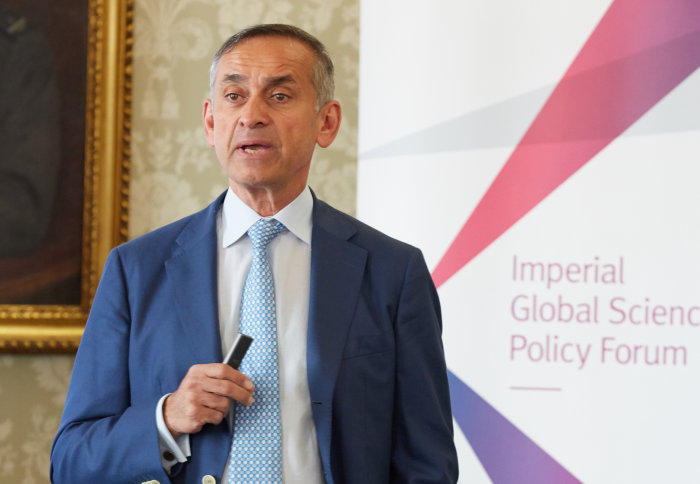Leading academics reveal how innovation is tackling global health challenges

Leading academics revealed how innovation is tackling global health challenges at the latest Imperial Global Science Policy Forum event.
Diplomats from Argentina, Japan, Mexico, Brazil and France joined industry experts and leading scientists from Imperial to discuss global health priorities and the latest research.
Imperial’s Institute of Global Health Innovation, led by Lord Darzi, focuses on using innovation to tackle serious global health challenges. The Institute brings together a multidisciplinary team including clinicians, engineers and scientists.
Culture of Innovation
 Lord Darzi said: “Innovation doesn’t happen without nurturing a culture of innovation. Our idea was to create an institute with convergence of scientific areas. A condition of the centres within the Institute was to marry together two faculties or departments.”
Lord Darzi said: “Innovation doesn’t happen without nurturing a culture of innovation. Our idea was to create an institute with convergence of scientific areas. A condition of the centres within the Institute was to marry together two faculties or departments.”
Lord Darzi explained that the NHS had an unrivalled wealth of data compared to other health services.
 This enabled researchers to look at specific population groups, for example adults living with severe and enduring mental health in London.
This enabled researchers to look at specific population groups, for example adults living with severe and enduring mental health in London.
Lord Darzi said: “If you know the population, you can spend your money wiser – a powerful commissioning tool.”
Lord Darzi also highlighted technological innovation being developed at the Hamlyn Centre, and advances in surgery such as the iKnife.
International development
 Professor Charlotte Watts, Chief Scientific Adviser at the Department for International Development explained how their planning involves looking at ‘how the world might look like in 2030’.
Professor Charlotte Watts, Chief Scientific Adviser at the Department for International Development explained how their planning involves looking at ‘how the world might look like in 2030’.
Professor Watts said: “The UK public think things are getting worse in developing countries but in last 30 years we’ve had unprecedented economic growth.
“Extreme poverty is becoming increasingly an issue in Africa so as a department we need to focus on Africa.
“The majority of Africa will be urban by 2030 which can lead to an increase in non-communicable diseases.”
Frugal innovation
 Dr Matthew Harris from Imperial’s Centre for Health Policy, spoke about frugal and reverse innovation.
Dr Matthew Harris from Imperial’s Centre for Health Policy, spoke about frugal and reverse innovation.
Frugal innovation is about simplifying and repurposing existing technology, whereas reverse innovation is looking at low income countries and seeing what innovation they have that could be adopted.
He cited examples in India where they have used technology from a bus ticket printing machine to create a portable ECG for a tenth of the cost of a regular one.
And in Malawi, where they can’t afford standard orthopaedic drills, they have modified a regular hardware drill and put it inside a sterilised bag to carry out surgery.
Universal healthcare
 Dr Françoise Cluzeau is Associate Director of the Global Health and Development Group at Imperial.
Dr Françoise Cluzeau is Associate Director of the Global Health and Development Group at Imperial.
Based within the Centre for Health Policy, the group leads on the international Decision Support Initiative (iDSI), a global network of academic institutes, government agencies and think-tanks, which supports low and middle income countries to get more health and better value for money for every dollar they spend.
Dr Cluzeau said: “For low and middle income countries, moving towards universal healthcare coverage is challenging.
“We provide direct technical assistance in developing clinical guidelines, pathways, methods and processes. “
They are working in countries including India, China, South Africa, Ghana and Kenya.
Sustainable Development Goals
 Opening the event, which was inspired by the United Nations World Health Day, Professor Simone Buitendijk, Imperial’s Vice-Provost (Education) explained how Imperial research is tackling issues linked with the UN’s Sustainable Development Goals such as poverty, hunger, health and climate change.
Opening the event, which was inspired by the United Nations World Health Day, Professor Simone Buitendijk, Imperial’s Vice-Provost (Education) explained how Imperial research is tackling issues linked with the UN’s Sustainable Development Goals such as poverty, hunger, health and climate change.
Professor Buitendijk said ‘these are issues that are important for every country in the world.’
She also explained how Imperial is introducing a new learning and teaching strategy, and as part of that has launched an online Masters in Global Public Health.
Professor Buitendijk said ‘public health is an important topic for the world right now’.
The next Imperial Global Science Policy Forum event is in October and will focus on Artificial Intelligence.
Article text (excluding photos or graphics) © Imperial College London.
Photos and graphics subject to third party copyright used with permission or © Imperial College London.
Reporter
Stephen Johns
Communications Division